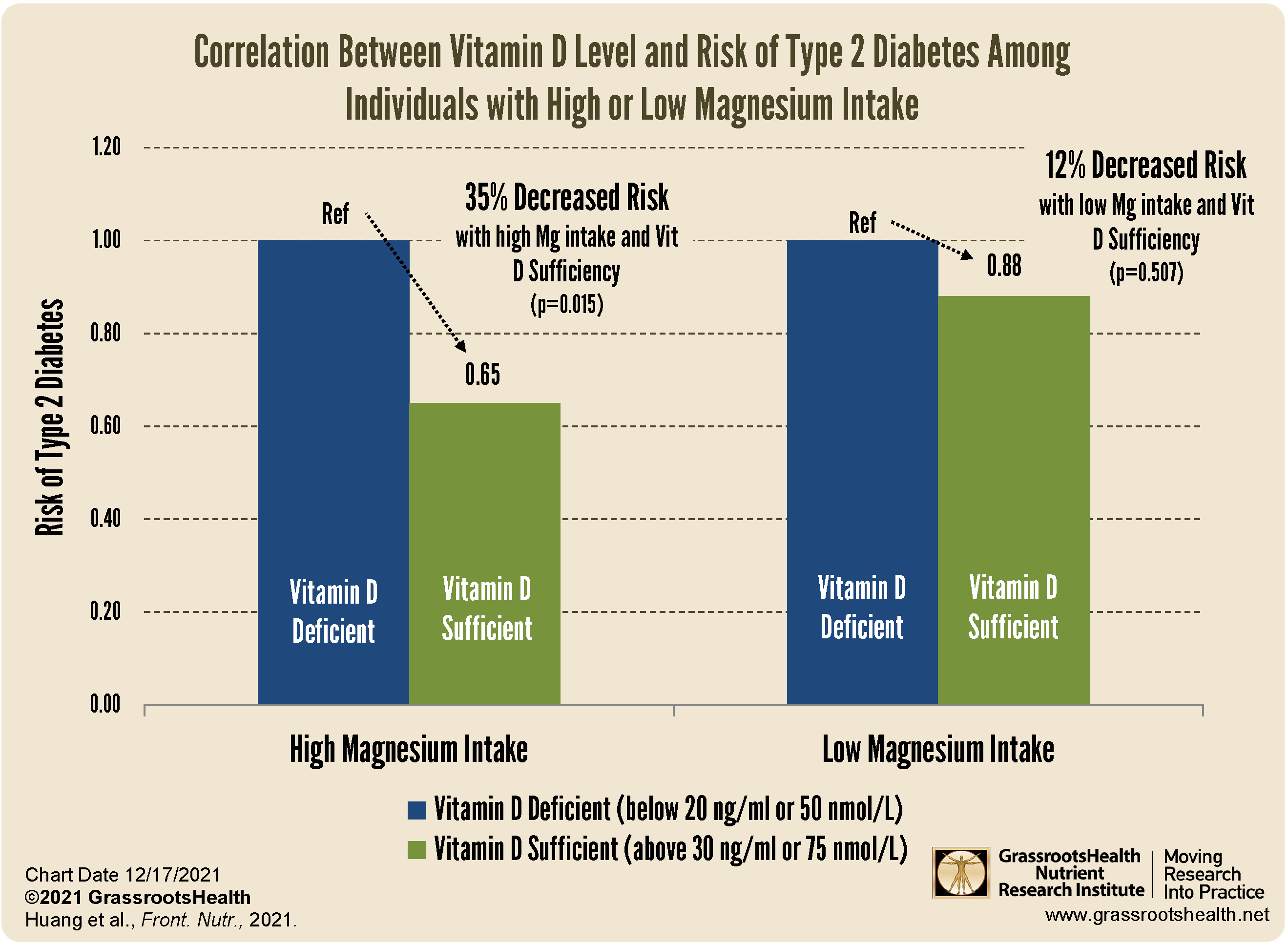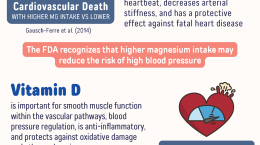Published on April 4, 2024
From diabetes, to high blood pressure, and more… Magnesium and vitamin D work together synergistically, in such a way that the interaction of both is greater than the sum of their individual effects
Key Points
- Vitamin D and magnesium each have their own effects on health, including lowering high blood pressure. However, a new study shows that the combination of higher vitamin D levels and higher magnesium intake has an even stronger effect on lowering blood pressure than either alone.
- Higher vitamin D levels were associated with a decreased incidence of type 2 diabetes, and the significance of the effect was greater among those who got more magnesium
- Studies looking at the combined effect of vitamin D and magnesium have had outcomes such as improved ADHD symptoms, reduced severity of COVID-19, reduced risk of anemia, and improved cognition

Magnesium is an important co-nutrient for vitamin D, and is involved in the biosynthesis, transport, and activation of vitamin D. Studies have shown that poor magnesium status potentially impairs vitamin D metabolism enough to limit the parathyroid hormone (PTH) response, which increases the activation of vitamin D to then increase calcium absorption.
An existing magnesium deficiency may also result in a vitamin D level that does not increase as much as expected in response to vitamin D supplementation. As illustrated by Deng et al., without sufficient magnesium, the amount of vitamin D that can be metabolized and used by the body is limited and may result in a lack of conversion of vitamin D into its other active forms.
Higher Magnesium Intake Strengthens Effect of Vitamin D on Lowering Blood Pressure
It is known that vitamin D and magnesium each have their own effects on health, including lowering high blood pressure. However, a new study shows that the combination of higher vitamin D levels and higher magnesium intake has an even stronger effect on lowering blood pressure than either alone.
The study by Huang et al. looked at how magnesium intake affected the association between vitamin D and blood pressure among 8,799 adults ages 20 years or older. The data used was from the National Health and Nutrition Examination Survey (NHANES) from 2007 through 2014. Comparisons were made between vitamin D and systolic blood pressure (SBP) and vitamin D and diastolic blood pressure (DBP) with either low magnesium intake (less than 299 mg per day) or high intake (at least 299 mg per day).
This study not only confirmed vitamin D’s relationship to SBP, where higher vitamin D levels were associated with lower SBP, it also showed that the relationship between vitamin D and systolic blood pressure was stronger among the high magnesium intake group compared to the low magnesium intake group.
As the authors state,
“it was found that dietary magnesium intake and vitamin D had an interactive effect on reducing SBP in most of the models, which indicates that the interaction of high serum vitamin D and high intake of magnesium is greater than the sum of the individual effects.”
Magnesium Intake Also Affects Association between Vitamin D and Risk of Type 2 Diabetes
Another study by Huang et al. found that magnesium intake affected the association between vitamin D level and the incidence of type 2 diabetes, where the distribution of vitamin D levels between participants with or without type 2 diabetes was not significantly different in the low magnesium intake group, but was in the high magnesium intake group.
In the group with high magnesium intake, there was a 35% significantly decreased risk of type 2 diabetes among the participants with vitamin D sufficiency compared to those with vitamin D deficiency, compared to the group with low magnesium intake, which only had a 12% decreased risk among those with vitamin D sufficiency, and the finding was not significant.
In other words, higher vitamin D levels were associated with a decreased incidence of type 2 diabetes, and the significance of the effect was greater among those who got more magnesium.
Other Outcomes Associated with the Combination of Vitamin D and Magnesium
Studies looking at the combined effect of vitamin D and magnesium have had outcomes such as improved ADHD symptoms, reduced severity of COVID-19, reduced risk of anemia, and improved cognition.
Make Sure You Are Getting Enough of Both Vitamin D, and Magnesium!
 Having and maintaining healthy vitamin D levels and other nutrient levels can help improve your health now and for your future. Choose which additional nutrients to measure, such as your omega-3s and essential minerals including magnesium and zinc, by creating your custom home test kit today. Take steps to improve the status of each of these measurements to benefit your overall health. With measurement you can then determine how much is needed and steps to achieve your goals. You can also track your own intakes, symptoms and results to see what works best for YOU.
Having and maintaining healthy vitamin D levels and other nutrient levels can help improve your health now and for your future. Choose which additional nutrients to measure, such as your omega-3s and essential minerals including magnesium and zinc, by creating your custom home test kit today. Take steps to improve the status of each of these measurements to benefit your overall health. With measurement you can then determine how much is needed and steps to achieve your goals. You can also track your own intakes, symptoms and results to see what works best for YOU.
Enroll in D*action and Test Your Levels Today!






